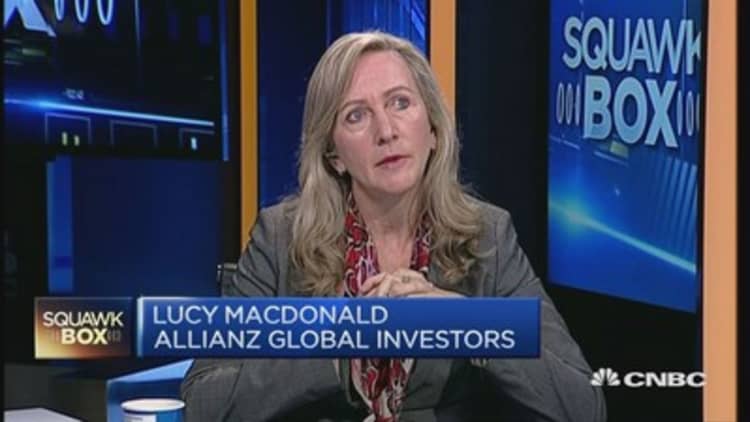


Market returns ahead are likely to be less robust, but the recent selloff has made Europe's stocks look more attractive, Allianz Global Investors' CIO for global equities told CNBC.
"After the last selloff, that's one place we'll definitely be looking to add a little bit," Lucy Macdonald, chief investment officer for global equities at the German-headquartered fund manager, told CNBC's "Asia Squawk Box." AGI manages 421 billion euros worth of assets.
The pan-European index closed Monday down 0.3 percent, totting up a nearly 7 percent decline year-to-date. But Macdonald's is not an unqualified positive call.
"The politics is definitely messy and is likely to remain messy. It is Europe after all," she said.
The continent is struggling amid an upsurge of nationalism as migrants fleeing violence in the Middle East continue to land on its shores, with more than a million arriving last year. Many countries within the European Union are reintroducing border checks to stem the flow - steps that could harm the free movement of people and goods, a cornerstone of the bloc's existence.
Terrorist attacks in Paris have also heightened tensions in the region.
"But when you look at what's going on at the economy level, it is a bit better. And last year we did get some surprise on the upside," Macdonald said. "That's down to very low interest rates, to oil prices which have certainly helped and some work on reform as well."
The euro zone economy has shown signs of recovering. Markit said last week that its PMI for the economic zone hit a four-month high of 54.3 in December, up from November's 54.2, citing a "robust increase in new business."
"It's not great, but it is moving in the right direction. And that is helpful and the euro being relatively weak against the dollar does no harm," MacDonald said.
The European Central Bank (ECB) plans to extend its massive 60 billion euro-a-month bond-buying program at least through March 2017. That should help to keep its currency weak, supporting exports, as well as encouraging the purchase of risky assets, such as stocks and corporate bonds.
But Macdonald isn't positive about Europe across the board. While Societe Generale recently took a positive view on Russian assets, she's far from upbeat.
"Buying Russia, you're buying oil. You can buy it somewhere else. And there's really not much else that you go there for. You can buy oil without taking on that sovereign risk," Macdonald said.
Russia's economy likely contracted 3.8 percent last year, and it's likely to shrink another 0.7 percent next year, the World Bank said last week. The economy there has been decked by the drop in oil prices, which are around 12-year lows. Both West Texas Intermediate (WTI) futures and Brent tumbled to around $31 a barrel in Asia trade Tuesday.
As of 2013, natural resources, including oil, natural gas and other commodities, contributed around 18.8 percent of Russia's gross domestic product (GDP), according to World Bank data.
When it comes to other plays on oil, though, MacDonald isn't too encouraging.
"If you're starting at today's valuations, on some of the larger, integrated (companies), where they can fund the dividend, then you have something to go on to value the stocks and then you're looking at yields that are twice the market rate," she said. "It's not a bad place to start, but you could be waiting some time" for oil prices to recover.
For that to happen, more production cuts are needed and, in a circular fashion, the timing of those will depend on the oil price , she said.
"In the U.S. they can turn (production) on and off very quickly," she noted. "That's why the Saudis are really slightly stuck, because they can't pull back (on production) because there hasn't been enough production cutting (elsewhere) yet and they know if they do, then it'll start up again," in the U.S.
—By CNBC.Com's Leslie Shaffer; Follow her on Twitter @LeslieShaffer1




